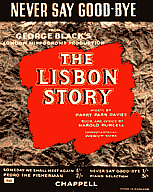The Lisbon Story
Book and Lyrics by Harold Purcell; Music by Harry Parr Davies
London Hippodrome, 17 June, 1943 (492 perfs)
Re-opened Stoll Theatre (after touring) 17 October, 1944 (54 perfs)
Synopsis
This exciting spy play of the 2nd World War was produced at the London Hippodrome one night during a blitz in 1943, when the light-hearted drama within had to compete with the human drama without. Nevertheless, its music was still being heard long after the noise of enemy aircraft was no more. Pedro, the Fisherman will indeed be heard even into the Space Age, as will most of the music, set to such excellent lyrics, by a composer whose early demise robbed the Musical Theatre of a melodist comparable to Ivor Novello.
Good acting is called for by all the cast, for the story is full of dramatic episodes, portraying the tension of the peoples in occupied France, of espionage and counter espionage, of cowardice and heroism, of Nazi intrigues and the forced gaieties of Paris. It is never melodramatic, always thoroughly believable and leavened throughout with a fine balance of comedy situations.
Four of the major principals have no songs to sing but Gay, the leading role (created by Patricia Burke) has two lovely songs, the waltz Someday We Shall Meet Again and the stirring Song of the Sunrise, which brings down the Curtain on Act One. Lola (mezzo) has a great point number, Madame Louise, Gonzales (tenor) shares the duet, Never Say Goodbye, Ramon (baritone) has two brilliant songs, Music at Midnight and Serenade for Sale, and Carmelita (coloratura) has the Carnival Song. It is a fine singing show in which the chorus are well featured.
Staging is not particularly difficult, nor is the costuming. There is a Ballet and much other dancing calling for an experienced choreographer
Story
In this exciting story of Second World War espionage, Parisian singing star Gabrielle Girard is parted from the man she loves. He is David Warren of the British Foreign Office who has been posted to Washington.
By chance they meet again in Lisbon, a neutral centre of wartime intrigue. Here David and co-agent Mike O’Rourke are caring for Lisette Sargon, whose scientist father is expected to be smuggled from France with important secrets for the allies. Unfortunately, he is captured and imprisoned by the Nazis in France. Von Schriner is a Nazi Cultural representative whose job it is to persuade exiled and distinguished artists to return home and resume their careers. Gabrielle declines his professional and romantic overtures until he agrees to let her choose the people she wants to appear with and to run her theatre in Paris. She is then able to get Sargon released from a concentration camp and to reunite him with Lisette.
When Von Schriner discovers the scientist’s identity he threatens to disclose all he knows unless Gabrielle becomes his mistress. There follows an attempt by David and Mike to smuggle Gabrielle, Sargon and Lisette to London after opening of the musical “La Comtesse” in which Gabrielle and Lisette are appearing. In order to create a diversion Gabrielle impersonates Lisette and rouses the audience with a patriotic speech. To the sounds of The Marseilleise, revolver shots, and British bombs, the curtain falls.
Cast:
|
|
|
Musical Numbers:
- Someday We Shall Meet Again
- Madame Louisa
- Music At Midnight
- A Serenade for Sale
- Happy Days
- We Must Never Say Goodbye
- Pedro the Fisherman
- Follow the Drum
- For the First Time (I Have Fallen in Love)
- Song of the Sunrise
Libretto and Vocal Score on Sale
Instrumentation:
Flute, Oboe, 2 Bb Clarinets, Bassoon; 2 Horns, 2 Bb Trumpets, Trombone: Percussion, Harp; Strings.